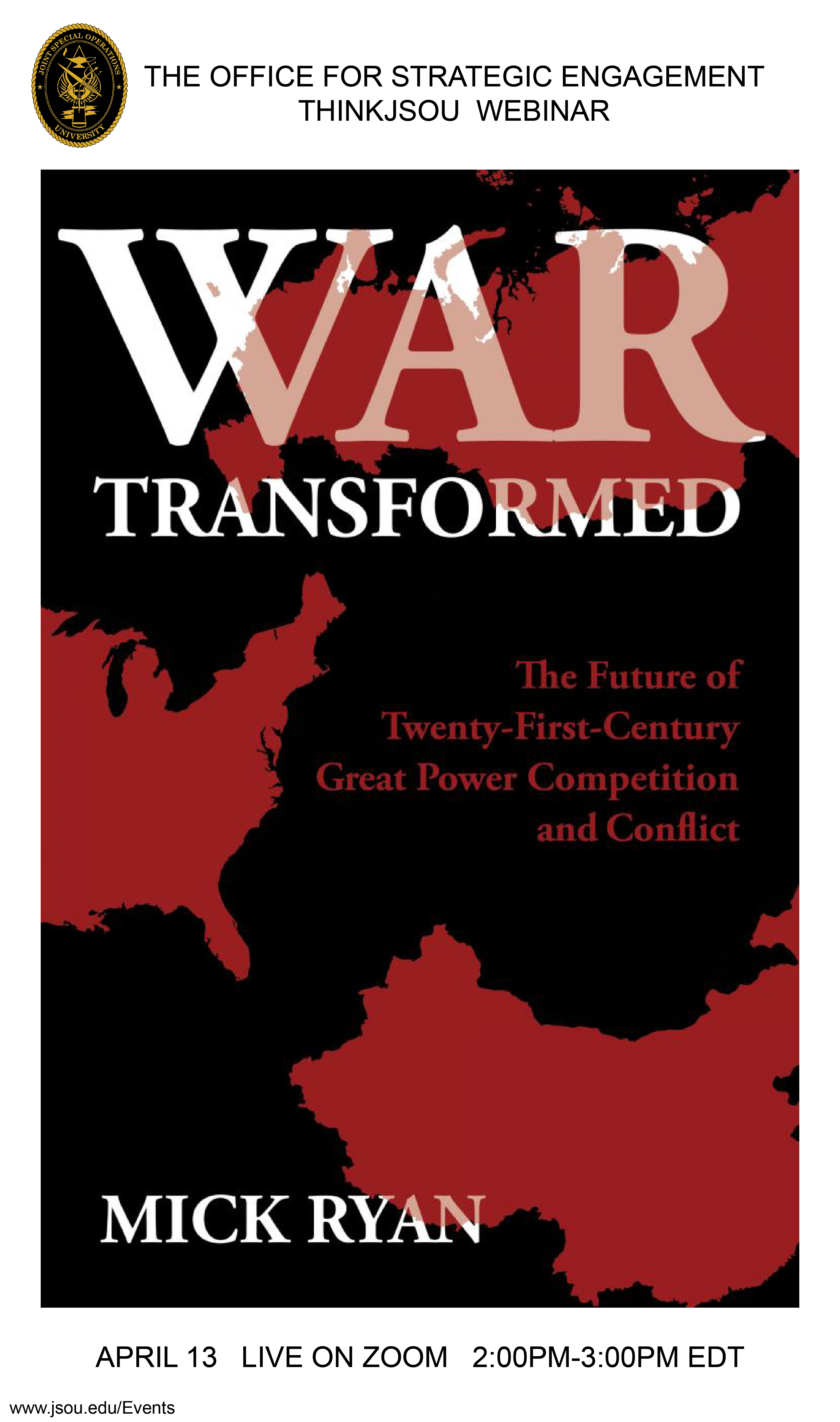About JSOU
Popular Resources
Upcoming Courses
*Continuous Learning (CL) courses are not shownEnterprise Management Course
Joint Fundamentals Course
Logistics Support to Sensitive Activities
Recent Publications
Fading into the Background: From Risk Awareness to Technological Intuition
The Special Forces Identity Crisis and Rethinking All of Special Operations
Special Operations Forces Enterprise: Strategic Intelligence and Emerging Technology
Featured Publications
Quick Links
About JSOU
Popular Resources
Upcoming Courses
*Continuous Learning (CL) courses are not shownEnterprise Management Course
Joint Fundamentals Course
Logistics Support to Sensitive Activities
Recent Publications
Fading into the Background: From Risk Awareness to Technological Intuition
The Special Forces Identity Crisis and Rethinking All of Special Operations
Special Operations Forces Enterprise: Strategic Intelligence and Emerging Technology
Featured Publications
Quick Links
About this event
The Joint Special Operations University Office for Strategic Engagement hosted a live ThinkJSOU webinar with Major General Mick Ryan, Australian Army, Retired, for a discussion on his latest book War Transformed: The Future of Twenty-First Century Great Power Competition and Conflict.
War
Transformed is an exploration of the changing character of warfare and how it
will impact the military's most critical asset: its human capital. Ryan
provides important insight into how the future of competition and conflict,
replete with technological and operational reform, requires the development of
an intellectual edge within the military with requisite changes across training
and education. Moderated by JSOU Non-Resident Fellow Dr. Jennifer McArdle,
Ryan's findings have increased salience for special operators, particularly in
the "Fourth Age of SOF."
More from Mick Ryan:
War Transformed: The
Future of Twenty-First-Century Great Power
White Sun War: The
Campaign for Taiwan
The Intellectual Edge:
A Competitive Advantage for Future War and Strategic Competition,
National Defense University Press
Mick Ryan on Twitter: https://twitter.com/WarintheFuture
Further Reading Mentioned in this Webinar:
To Change an Army
by General Donn A. Starry, written for Military Review in 1983
Fighting by Minutes:
Time and the Art of War by Robert R. Leonhard
Chinese Tactics, ATP
7-100.3, Headquarters Department of the Army
The U.S. Chips Act,
Congress.gov/Whitehouse.gov
Quotes from this
Webinar:
"We really are in the
realm of fighting by microseconds, and at the same time we're fighting in
decades."
"With some of the autonomous systems that are coming, we
won’t be tool users, we will be tool partners, and partnering with machines is
not a concept that any of our training or education or organizational
constructs, or even our doctrine really accounts for. It is still very much the
old-style tool use rather than partnering with machines, and that is going to
result in a fundamental change in how we think about war, how we think about
operations, and how we think about preparing for it."
"We may be trained to
use or fly or drive, and these kinds of things but it doesn’t mean you are
technologically literate. We need to educate all our people on some of the
fundamentals about artificial intelligence, big data, some of the flaws that
are inherent in them, as well as things like autonomy in all environments not
just in the aerial or ground ones."
"Technology is not a silver bullet, it never has been in warfare. It's really
useful to have better technology than your adversary, but it doesn't always
endow on you a war winning advantage. What does convey on you the winning
advantage is the ability to have the best concepts and the best organizations
and the best leadership that leverages that technology in the smartest ways,
and then learn about its use and evolve and adapt its use as you go on. It's
not just about knowing what the technologies are and understanding which of the
right ones to invest in as an institution. It's having those doctrinal
organizational and leadership frameworks that you wrap around them to ensure
their used well so you you win battles and your wars."
"The art of training and education in the twenty first century is to be able to
make people resilient enough, once they do get surprised they're able to fight
through that shock as quickly as possible and adapt so that surprise isn't
possible again."
"If I was thinking about mobilization now, I’d be bringing in the most senior
industrial executives with the most experience, and saying, well, if you were
the Tsar of this mobilization process, what are the first five things that you
would do? What are the key technologies that are critical manufacturers that we
need to prioritize the use of and then how do we prioritize our skilled
workforce to the most important things around the mobilization process? Because
there'll never be enough people or resources for everything we want to do. I think
that's the number one lesson we get from the mobilization that countries like
the United States, and even my own, undertook in WWII. Not so much converting
factories and these kinds of things."
"Coalitions and alliances are vital. You can't win
without them, and you go all the way back to Antiquity, the most successful
organizations are those that have fought alongside friends."
"Alliances are far more than just the military dimension. There's a whole lot of
other dimensions like technology, intellectual development beyond technology as
well as mining and infrastructure and communications that are important."
"I think the future of special operations and conventional is more convergent to
generate a strategic advantage…The future of special [operations] is about
complementing and converging with conventional, whilst maintaining the very
special skills and approaches that the special operations community brings, and
will continue to bring in the future."
"I think the most important thing you can do is kind of
let your imagination run wild. That's what the enemy's gonna do, and it's too
late once you're in the thick of a fight to start imagining what the future is
going to look like. You've got to be able to do that well before a conflict,
and you can only do that if you let your junior and middle ranking people get
out there imagine different futures wargame them, test technologies, test new organization,
and test new warfighting ideas. I mean this isn't going to emerge from the
Pentagon or from the highest-level military headquarters. People there are too
busy answering emails. The real innovation that's required to make us effective
in the future and help us win in the future is going to come from the ground up
and from the middle of the organization, and that's where we need to be providing
the right incentives for the right behaviors to have creative military
organizations."
Major General Ryan
spent 35 years in the Australian Army and commanded soldiers at troop,
squadron, regiment, task force and brigade levels. In February 2022, Mick
retired from the Australia Army. In the same month, his book War Transformed
was published by USNI Books. He has a long-standing interest in military
history and strategy, advanced technologies, organizational innovation, and
adaptation theory. He was inaugural President of the Defence Entrepreneurs
Forum (Australia) and is a member of the Military Writers Guild. He is a keen
author on the interface of military strategy, innovation, and advanced
technologies, as well as how institutions can develop their intellectual edge.
He is an adjunct fellow at the Center for Strategic and International Studies
in Washington DC, and a non-resident fellow of the Lowy Institute in Sydney. In
January 2023 Mick was also appointed as an Adjunct Professor at the University
of Queensland in Brisbane, Australia.
Dr. Jennifer McArdle is the Senior Director for Defense Programs and the
Deputy Chief Learning Officer at CAE USA, Inc, a commercial company that helps
the military develop and maintain the highest levels of mission readiness. She
also serves as an Adjunct Senior Fellow in the Center for a New American
Security’s wargaming lab and as a Non-Resident Fellow at the Joint Special
Operations University. A former professor, Dr. McArdle has served on
Congressman Langevin’s cyber advisory committee and as an expert member of a
NATO technical group that developed cyber effects for the military alliance’s
campaign simulations. Dr. McArdle holds a Ph.D. from King’s College London in
War Studies, is the recipient of the RADM Fred Lewis (I/ITSEC) doctoral
scholarship in modeling and simulation, and is a certified modeling and
simulation professional (CMSP) and wargamer. She is a term member with the
Council on Foreign Relations and was named an official "Mad
Scientist" by the U.S. Army Training and Doctrine Command.
Nothing to show yet.
Nothing to show yet.

Jennifer McArdle
Dr. Jennifer McArdle is the Senior Director for Defense
Programs and the Deputy Chief Learning Officer at CAE USA, Inc,
a commercial company that helps the military develop and maintain the
highest levels of mission readiness. She also serves as an Adjunct Senior
Fellow in the Center for a New American Security’s wargaming lab and as a
Non-Resident Fellow at the Joint Special Operations University. A former
professor, Dr. McArdle has served on Congressman Langevin’s cyber advisory
committee and as an expert member of a NATO technical group that developed
cyber effects for the military alliance’s campaign simulations. Dr. McArdle
holds a Ph.D. from King’s College London in War Studies, is the recipient of
the RADM Fred Lewis (I/ITSEC) doctoral scholarship in modeling and simulation,
and is a certified modeling and simulation professional (CMSP) and wargamer.
She is a term member with the Council on Foreign Relations and was named an
official "Mad Scientist" by the U.S. Army Training and Doctrine Command.

Mick Ryan
Mick spent 35 years in the Australian Army and had the honour of
commanding soldiers at troop, squadron, regiment, task force and brigade levels.
He has a long-standing interest in military history and strategy, advanced
technologies, organizational innovation, and adaptation theory. He was
inaugural President of the Defence Entrepreneurs Forum (Australia) and is a member
of the Military Writers Guild. He is a keen author on the interface of military
strategy, innovation, and advanced technologies, as well as how institutions
can develop their intellectual edge.
In February 2022, Mick retired from the Australia Army. In the
same month, his book War Transformed was
published by USNI Books. He is an adjunct fellow at the Center for Strategic
and International Studies in Washington DC, and a non-resident fellow of the
Lowy Institute in Sydney. In January 2023 Mick was also appointed as an Adjunct
Professor at the University of Queensland in Brisbane, Australia.
He runs his own strategic advisory company and is a regular
columnist in the Sydney Morning Herald and ABC Australia. His next book, White
Sun War, will be published in April 2023 by Casemate Books. It is a
fictional account of a future war over Taiwan.
